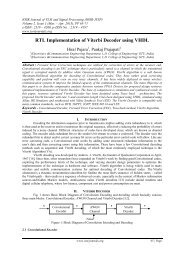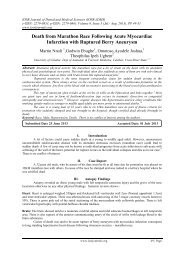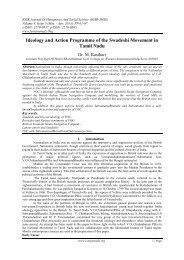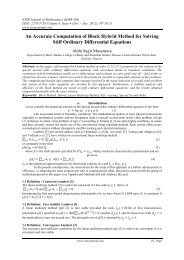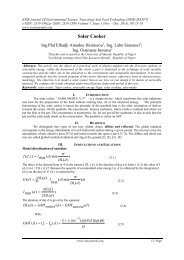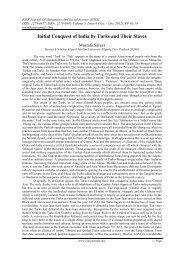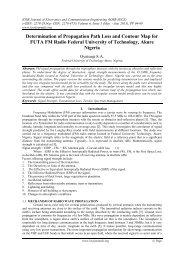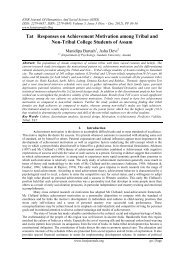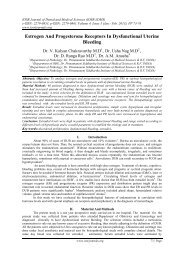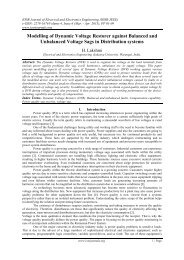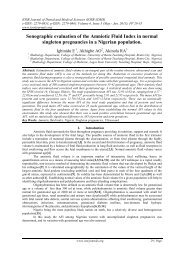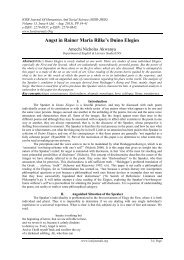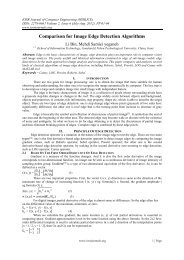Design Compatibility of Classroom Furniture in Urban and ... - IOSR
Design Compatibility of Classroom Furniture in Urban and ... - IOSR
Design Compatibility of Classroom Furniture in Urban and ... - IOSR
You also want an ePaper? Increase the reach of your titles
YUMPU automatically turns print PDFs into web optimized ePapers that Google loves.
Fuel Subsidy Removal And M<strong>in</strong>d Control Game In Nigeria: A Critical Discourse Analysis Perspective<br />
This formed the kernel <strong>of</strong> Senator Saraki‘s argument, while mov<strong>in</strong>g the motion for <strong>in</strong>vestigation <strong>in</strong>to<br />
the management <strong>of</strong> subsidy <strong>in</strong> 2011, (Amanze-Nwachukwu, 2011; Kolawale, 2012). His words:<br />
In furtherance <strong>of</strong> the implementation <strong>of</strong> the fuel subsidy <strong>in</strong> 2011 appropriation, the sum <strong>of</strong> N240 billion (N20<br />
billion monthly) is budgeted. Of the N20 billion monthly allocated, N11.2billion was allocated for domestic fuel<br />
subsidy (NNPC) <strong>and</strong> N8.8 billion for domestic subsidy (market) as stated <strong>in</strong> the Appropriation Act 2011.<br />
Although, N20 billion was set aside for subsidy on a monthly basis <strong>in</strong> the Appropriation Act 2011, <strong>in</strong> August<br />
2011, the total figure expended was N165bn <strong>of</strong> which the NNPC was N88 billion <strong>and</strong> Independent Marketers<br />
was N77.7 billion. In the first three months <strong>of</strong> the year, both the NNPC <strong>and</strong> the Independent Marketers did not<br />
exceed N62 billion monthly but with<strong>in</strong> the last three months, figures have ranged between N150 billion <strong>and</strong><br />
N186 billion. With this trend, by the year-end, we will have a fuel subsidy bill <strong>of</strong> over N1.2 trillion as aga<strong>in</strong>st<br />
the N240 billion budgeted <strong>in</strong> the Appropriation Act. The implementation <strong>of</strong> 2011 Appropriation Act will surely<br />
be <strong>in</strong> troubled waters if a variation <strong>of</strong> N1.2 trillion arises as a result <strong>of</strong> the level <strong>of</strong> expenditure <strong>in</strong>curred on fuel<br />
subsidy so far.<br />
Worse still, the blissful ignorance <strong>of</strong> government about the exact amount it spends annually to susta<strong>in</strong><br />
the so-called subsidy came to light when the chairman <strong>of</strong> Revenue Mobilisation Allocation <strong>and</strong> Fiscal<br />
Commission (RMAFC), Mr Elias Mbam disclosed that both the NNPC <strong>and</strong> the oil marketers under the<br />
Petroleum Products Pric<strong>in</strong>g Regulatory Agency (PPPRA) had illegally deducted the sum <strong>of</strong> N1.079 trillion for<br />
fuel subsidy between January <strong>and</strong> September this year. Mr Mbam said that while the NNPC deducted N615.670<br />
billion from January to September as aga<strong>in</strong>st N81.720 billion payable to it as conta<strong>in</strong>ed <strong>in</strong> the 2011<br />
Appropriation Act with a difference <strong>of</strong> over N5333.950 billion, the PPPRA deducted the sum <strong>of</strong> N647.660<br />
billion as aga<strong>in</strong>st the approved N102.753 billion <strong>in</strong> the 2011 appropriation with<strong>in</strong> the same period with a<br />
difference <strong>of</strong> over N544.907 billion. Mbam made the shock<strong>in</strong>g revelation at the House <strong>of</strong> Representatives jo<strong>in</strong>t<br />
committees on F<strong>in</strong>ance, Petroleum Resources (Downstream <strong>and</strong> Upstream) <strong>and</strong> Gas Resources <strong>in</strong>vestigat<strong>in</strong>g the<br />
alleged non-remittance <strong>of</strong> about N450 billion by the Nigerian National Petroleum Corporation (NNPC) between<br />
2005 <strong>and</strong> 2008 to the Federation Account, (Olatunji & Daniel, 2011).<br />
On the strength <strong>of</strong> the unfold<strong>in</strong>g realities <strong>of</strong> the fuel subsidy imbroglio, this group <strong>of</strong> Nigerians has<br />
coalesced <strong>in</strong>to a formidable opposition that summons all manners <strong>of</strong> verbal resources from its l<strong>in</strong>guistic arsenal<br />
to del<strong>in</strong>eate the <strong>in</strong>sensitive, callous, <strong>and</strong> uncar<strong>in</strong>g disposition <strong>of</strong> the Nigerian government. Perhaps, the<br />
frighten<strong>in</strong>g prospects <strong>of</strong> an Armageddon, which the opposition promises government should it go ahead with its<br />
planned subsidy removal, might have <strong>in</strong>formed government‘s gradual shift<strong>in</strong>g <strong>of</strong> ground on the January 2012<br />
implementation date. President Jonathan said it was necessary because <strong>of</strong> the plot by his critics to br<strong>in</strong>g his<br />
government down, not<strong>in</strong>g that the critics had given him their consent only to turn around to oppose it. The<br />
government, Mr. President further noted, had to s<strong>of</strong>t-pedal on the implementation date to ensure that all<br />
stakeholders were carried along through mass education <strong>and</strong> logical reason<strong>in</strong>g, Okoroanyanwu et. al. (2011).<br />
All <strong>in</strong> all, the forego<strong>in</strong>g analysis only goes to show that the m<strong>in</strong>d control battle is one conflagration that<br />
is set to roar <strong>and</strong> soar to the proverbial ‗high horrendous heavens.‘ The outcome <strong>of</strong> this duel is a matter <strong>of</strong> which<br />
group bl<strong>in</strong>ks first - the government or the Nigerian public.<br />
IV. Conclusion<br />
The focus <strong>of</strong> this paper has been with the conflict<strong>in</strong>g perspectives that tend to characterise the<br />
discourses <strong>of</strong> oil subsidy removal as a fundamental component <strong>of</strong> economic reforms <strong>in</strong> Nigeria. While the<br />
dom<strong>in</strong>ant group represented by the federal government canvasses capitalist-driven free ‗marketization‘ <strong>of</strong> the<br />
economy, the dom<strong>in</strong>ated group represented by the labour unions, civil society groups, <strong>and</strong> other advocates <strong>of</strong><br />
neo-liberalism draws attention to its attendant negative effects on the poor masses <strong>of</strong> Nigerians. The analysis<br />
reveals the extent to which the dom<strong>in</strong>ant groups <strong>in</strong> our contemporary society use all shades <strong>and</strong> hues <strong>of</strong> coercive<br />
tactics, persuasion, <strong>and</strong>/or <strong>in</strong>terpersonal <strong>and</strong> group-based <strong>in</strong>fluence manipulations to control public discourse<br />
<strong>and</strong> ram unpopular policies down the throat <strong>of</strong> the silent majority, <strong>and</strong> how the latter equally appropriates the<br />
evocative powers <strong>of</strong> discourse <strong>and</strong> access to the media to resist the systemic class dom<strong>in</strong>ation <strong>and</strong> oppression.<br />
By implication, the theoretical <strong>and</strong> methodological perspectives <strong>of</strong> CDA that <strong>of</strong>fer useful <strong>in</strong>sights <strong>in</strong>to the<br />
work<strong>in</strong>gs <strong>of</strong> society have proved quite <strong>in</strong>valuable for objective <strong>in</strong>terpretation <strong>of</strong> the mean<strong>in</strong>gs <strong>and</strong> proper<br />
distillation <strong>of</strong> the two-sided ideological polarities underly<strong>in</strong>g those texts under review.<br />
Perhaps, one outst<strong>and</strong><strong>in</strong>g value <strong>of</strong> this l<strong>in</strong>e <strong>of</strong> academic <strong>in</strong>quiry is the explicit recognition by critical<br />
discourse analysts <strong>of</strong> their crucial role <strong>in</strong> the society. Of course, it goes without say<strong>in</strong>g that this l<strong>in</strong>e <strong>of</strong> reason<strong>in</strong>g<br />
is born out <strong>of</strong> their conviction that scholarly discourses generally are <strong>in</strong>herently part <strong>of</strong> <strong>and</strong> <strong>in</strong>fluenced by social<br />
structure, <strong>and</strong> produced <strong>in</strong> social <strong>in</strong>teraction, (Dijk, 1998; 2003). Moreover, given that the fundamental<br />
theoretical <strong>and</strong> methodological perspectives <strong>of</strong> CDA are ‗socio-politically situated,‘ occasional reflections on<br />
the role <strong>of</strong> scholars <strong>in</strong> society <strong>and</strong> the polity thus becomes an <strong>in</strong>herent <strong>and</strong> <strong>in</strong>tegral part <strong>of</strong> the discourse<br />
analytical enterprise. Accord<strong>in</strong>gly, such enterprise embarks on empirically adequate critical analysis <strong>of</strong> social<br />
problems, thus expla<strong>in</strong><strong>in</strong>g discourse structures <strong>in</strong> terms <strong>of</strong> properties <strong>of</strong> social <strong>in</strong>teraction (especially social<br />
www.iosrjournals.org<br />
12 | Page



